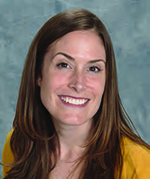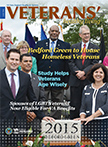Veterans' Healthy Living, Fall 2015
Study Helps Veterans Age
There is good news and bad news when it comes to aging wisely. First, the bad news: no magic pill or potion can keep you physically and mentally robust into your golden years. The good news is Veterans have Dr. Maureen O’Connor on their side, helping them understand what normal aging is like and providing tips to keep their brain healthy at any age.
 Dr. O’Connor shared an example of aging wisely: “One example we use is a woman named Helen, who was discussed on National Public Radio in 2011. She wasa healthy, active, and social109-year-old who lived at home.She loved chocolate truffles and her favorite beverage was Budweiser beer. Many people want to age like Helen! And Helen is only one example of adults that are aging well into their 80s, 90s, and even 100s.”
Dr. O’Connor shared an example of aging wisely: “One example we use is a woman named Helen, who was discussed on National Public Radio in 2011. She wasa healthy, active, and social109-year-old who lived at home.She loved chocolate truffles and her favorite beverage was Budweiser beer. Many people want to age like Helen! And Helen is only one example of adults that are aging well into their 80s, 90s, and even 100s.”
Dr. O’Connor teaches a 12-week class called AgeWISE, (Aging Well through Interaction and Scientific Education). AgeWISE is part of a study she is conducting open to any Veteran over age 50. “The classes began,” she said, “because I was seeing patients in their 50s who wondered whether their memory problems were normal or the result of something like Alzheimer’s disease or dementia. One of my colleagues, Dr. Malissa Kraft, was in a similar situation, with patients coming in for a comprehensive evaluation but who had normal test results.” She said despite the doctors’ attempts to educate patients about how brains age, patients were still anxious about misplacing keys or forgetting someone’s name and wanted to know how to preserve their brain health.
“My colleague and I are runners,” said Dr. O’Connor, “so over thousands of miles, we discussed how to get these people together in one place where we could spend more time with them than we can during office visits.” Thus, they began the class AgeWISE.
She explained in the beginning, she and her colleague simply assembled a group of patients and gave them handouts. Over time and through Veteran feedback, the group evolved into a formal class, and Dr. O’Connor began studying the effects of the class. A secondary study, now part of the Clinical Trials Network, involves interviewing Veterans and civilians to learn whether their aging experience differs.
 “We also want to know what ‘aging wisely’ means to Veterans. So far, we are hearing things like staying sharp, staying social, and being able to manage financially. I’m particularly interested in whether Veterans have different needs as they age compared to the general population and whether there are things we should address with them,” she explained. “A couple of Veterans have wondered how things like trauma and post-traumatic stress disorder affect the brain and aging, so I think some themes might emerge that show a difference between aging Veterans and aging civilians.”
“We also want to know what ‘aging wisely’ means to Veterans. So far, we are hearing things like staying sharp, staying social, and being able to manage financially. I’m particularly interested in whether Veterans have different needs as they age compared to the general population and whether there are things we should address with them,” she explained. “A couple of Veterans have wondered how things like trauma and post-traumatic stress disorder affect the brain and aging, so I think some themes might emerge that show a difference between aging Veterans and aging civilians.”
Dr. O’Connor said the earlier you start working toward brain health, the better. She added it is never too late to start and offered the following advice for people of all ages.
“Exercise—at appropriate levels—is one of the best things you can do for your brain at any age,” she said. “The CDC [Centers for Disease Control and Prevention] recommends that people get about 150 minutes a week of cardiovascular exercise of moderate intensity, which is about five days a week for 30 minutes. That seems to be just a starting point if you want to age successfully in terms of brain health.”
She said another key to aging wisely is to remain social and positive. “People with rich social networks age more successfully than others and typically have lower rates of mood disorders, cognitive decline, and death, so we encourage people to remain as socially active as possible. It is also important to maintain a positive attitude toward the aging process. A wealth of research suggests that a positive attitude about aging leads to proactive health behaviors and affects how people think and behave in everyday life.”

















